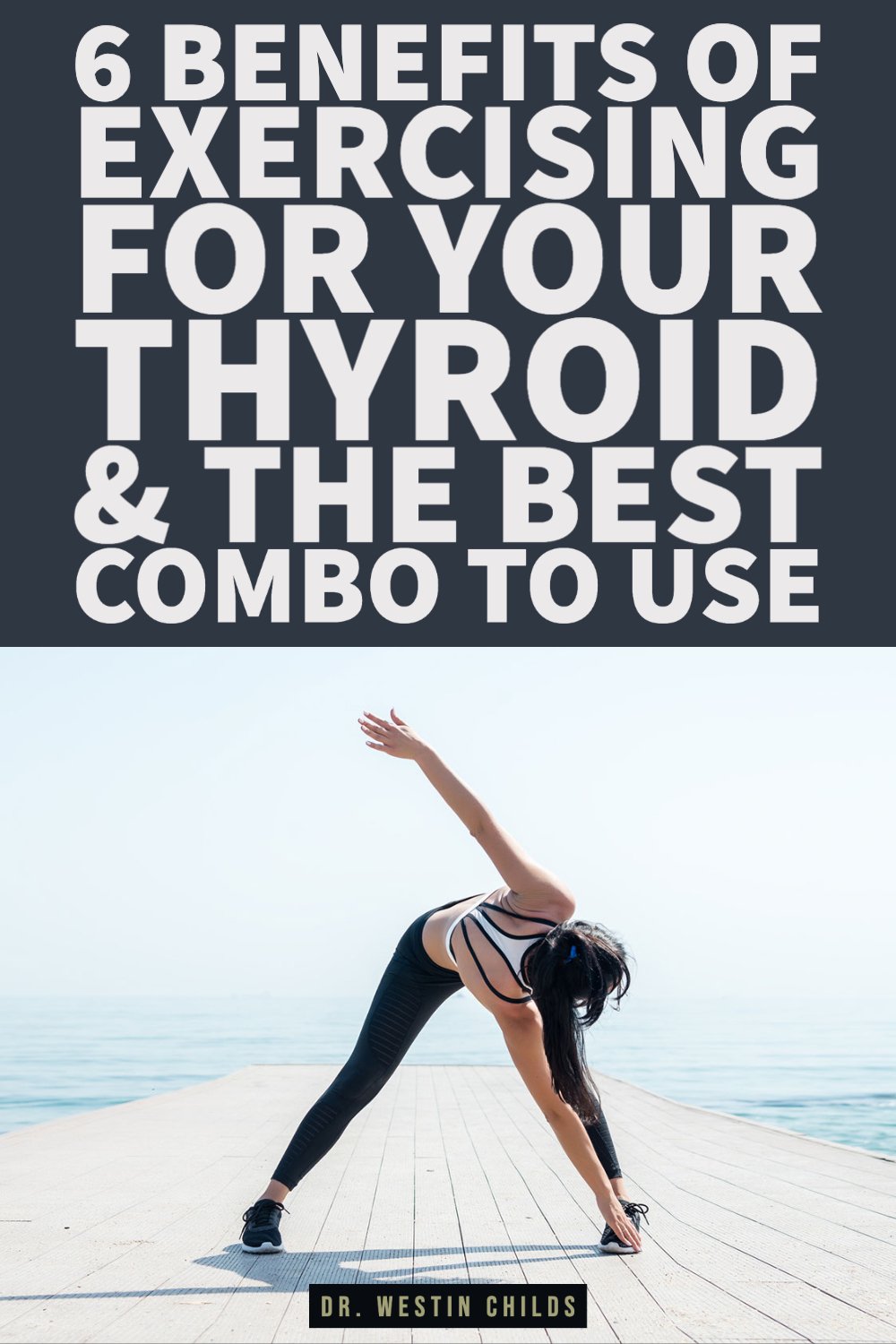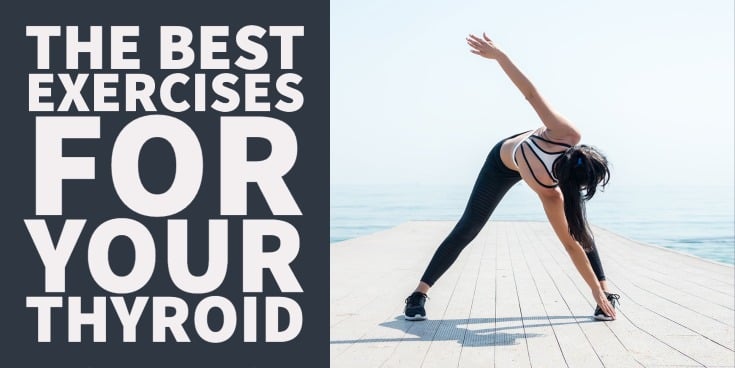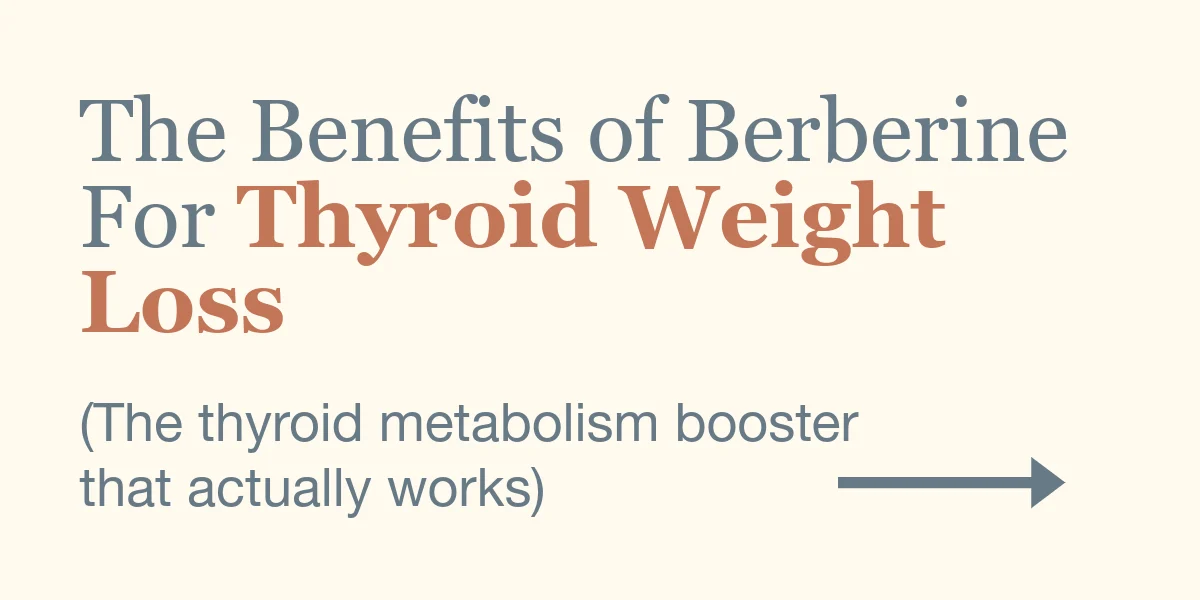Exercise is probably one of the best treatments that you can do for your thyroid and yet it’s something that most thyroid patients completely neglect.
Not only is it valuable for your thyroid but it’s also valuable for your entire body.
I know that some people need to know the why behind things like this, so let’s talk about the benefits first and then I’ll explain the absolute BEST exercises for your thyroid so you can actually obtain those benefits.
And if these benefits aren’t enough to get you to want to exercise, I don’t think anything will!
Benefit #1. Higher free thyroid hormone levels
This is HUGE for thyroid patients.
Think about it this way: why are you taking thyroid medication? To INCREASE your thyroid hormone levels (1).
Exercise is a free (for the most part) way to obtain these benefits and it doesn’t require the use of prescription medications!
The higher your free thyroid hormone levels are, the better your thyroid will function, and the more symptomatic control you will get.
I know it can be hard to exercise as a thyroid patient because of fatigue, but in a paradoxical way, exercising actually increases your energy overall by increasing thyroid function.
Research shows that exercise not only increases free T3 and free T4 but it also…
DOWNLOAD FREE RESOURCES
Foods to Avoid if you Have Thyroid Problems:
I’ve found that these 10 foods cause the most problems for thyroid patients. Learn which foods you should avoid if you have thyroid disease of any type.
The Complete List of Thyroid Lab tests:
The list includes optimal ranges, normal ranges, and the complete list of tests you need to diagnose and manage thyroid disease correctly!
Benefit #2. Reduces TSH levels.
TSH is one of the main tests that doctors use to assess thyroid function and a high TSH is associated with low thyroid function.
So it makes perfect sense that exercise would INCREASE thyroid hormone levels and DECREASE TSH levels (2).
This is just another way of stating that exercise improves the thyroid.
Again, this is huge because it means there’s something else that YOU as a thyroid patient can do to improve your thyroid that doesn’t require a doctor.
Normally, if you want to lower your TSH you’d have to increase your thyroid medication dose.
But you can obtain this benefit with exercise alone and without the need for altering your thyroid medication.
Benefit #3. Weight loss.
If improving your thyroid wasn’t enough to get you to want to exercise then maybe weight loss will be!
Exercise helps thyroid patients lose weight by balancing hormones, including thyroid hormone, increasing lean muscle mass (3), and increasing metabolism (4).
Not only will exercise help you burn more calories but it will also balance those fat-storing hormones like leptin and insulin.
Leptin, in particular, is a big problem for thyroid patients because both fat cells and thyroid hormones regulate it.
The more overweight you are and the more thyroid dysfunction that you have, the more likely you are to be leptin-resistant.
Based on my experience, weight gain is one of the most troubling symptoms that thyroid patients face and the symptom that takes the longest to resolve.
Exercise is one way to accelerate your weight loss efforts and make pretty much any weight loss therapy even more effective.
This includes hormones, medications, and supplements.
Benefit #4. Increased muscle mass & better muscle health overall.
Your muscles are a major target of thyroid hormone action where they regulate thyroid hormone signaling.
When thyroid hormone levels are low, you may start to experience muscle pain as a result.
Exercising helps to increase muscle mass which can reduce muscle pain, improve your metabolism, and overall improve muscle health.
This is also important if you are taking thyroid hormone medication because some of these hormones, like T3, may actually cause muscle catabolism.
Exercising can help offset the effects of T3 thyroid hormone medications like Cytomel and liothyronine.
It will also help with longevity and aging because maintaining muscle mass is key if you want to thrive as you get older (5).
Benefit #5. Improved mood
Thyroid patients frequently have issues with depression, irritability, and anxiety which can cycle back and forth.
Consistent exercise helps you feel happier and makes you more tolerant of negative situations.
In other words, it doesn’t force you to be happy but it makes dealing with the stressors of everyday life a whole lot easier.

This means it’s far more likely that your mood will be balanced.
It also can treat issues like brain fog which, again, many thyroid patients suffer from.
So whether it’s mood, brain fog, or fatigue, exercise helps.
Benefit #6. More consistent bowel movements
Believe it or not, exercise has been shown to treat constipation which is a problem that many thyroid patients suffer from.
When thyroid hormone levels are low, bowel movements decrease and you develop constipation.
If you’ve ever been constipated, you know that this is not a feeling you want to have stick around.
Exercise increases lymphatic flow and can sort of act to massage the intestines which promotes the emptying of the bowels.
The result is more frequent bowel movements and a better quality of life.
And, finally…
Benefit #7. A reduction in inflammation.
Obviously, you don’t want inflammation in your body in any way shape, or form but it’s especially harmful for thyroid patients because it impacts thyroid gland health and T3 levels.
Inflammation reduces T4 to T3 conversion which lowers T3 levels in the body and promotes thyroid gland damage in those with Hashimoto’s or Graves’ disease.
Exercise is an excellent treatment for hypothyroidism but also for all forms of autoimmune thyroid disease because of this.
How to Exercise Specifically For Your Thyroid
It’s pretty clear that exercise is beneficial for thyroid patients so the question is not whether should you exercise but rather how should you exercise.
And there are several different ways to think about this:
The first is with intensity.
Based on available research, thyroid patients get the biggest boost to thyroid function when exercising at 70% of their maximal heart rate (6).
I’ll teach you how to calculate this rate in just a second so stay tuned but for now, let’s go back to exercise.
This level of exercise is right at the cusp of moderate to vigorous based on the American Heart Association guidelines.
Basically, exercise between 50% to 70% of your maximal heart rate is considered moderate and 70-85% is considered vigorous.
Even though you get the MOST benefit at this 70% range for your thyroid, the reality is that you are still getting benefits at levels below 70% and at levels higher than 70%.
But there is a point at which these benefits decline and at which they may start to harm your thyroid.
And that level appears to start at around 90% of the maximal heart rate for conditioned athletes.
At this level, athletes started to see a decline in their T3 thyroid hormone levels, both free T3 and total T3.
This is very important because if you are a non-conditioned athlete, especially one with thyroid problems (like those reading this article), you will most likely start to see these negative effects at lower levels of intensity.
These higher levels of intensity, like 80%+ or higher or maximal heart rate, typically require high-intensity interval training to obtain.
For this reason, it’s generally a good idea to avoid high-intensity interval training as a thyroid patient at least when you are first starting out.
If you’ve been exercising for a long period of time and your body is already accustomed to HIIT training then you can keep doing it.
But if you are someone who is just starting out, it would most likely be best for you to start out at an intensity of around 40 to 50%.
This is because, again, you really don’t want to do anything to lower your T3 levels and you want to give your body some time to acclimate to these new levels.
Remember:
Thyroid patients tend to just be a little more fragile compared to the average population so it’s always best to start out low and go slow.
The worst thing you could do is start out at an intensity level that is higher than your body can manage which causes a decline in thyroid hormone and disrupts other hormones in your body.
How To Measure Your Maximal Heart Rate
Now, remember when I said I was going to teach you how to measure your maximal heart rate? Well, let’s do that right now:
It’s really easy to do. All you need is to subtract your age from the number 220 and this value will be your maximum heart rate (7).
From there, you just take a percentage and multiply it by that number to get your desired intensity.
So, for instance, if you wanted to measure out 70% of your maximal heart rate you would take 220 minus your age, and then multiply that number by 0.7 (which is 70%).
For me, at age 37, 70% of my maximal heart is 128 and I know from experience, that I can get pretty close to that level just by lifting weights.
You can easily calculate 50% or 70% of your own maximal heart rate using some simple math.
From there, it’s just a matter of paying attention to your heart rate with a cheap wearable device as you exercise.
The Best Type of Exercise For Thyroid Health
The next way to think about exercise is related to the type of exercise.
And here we have endurance, aerobic, strength training, flexibility, mobility, and so on.
For a thyroid patient, the absolute best combination of exercises will be aerobic training plus strength training (8).
The aerobic component because that’s just the easiest way to get your heart rate to the desired intensity level.
And the strength training component for its benefits on muscle mass, metabolism, bone health, and longevity.
And when I talk about strength training, we’re not talking about bodybuilding levels of intensity here.
All we are really talking about is added weight beyond your own body weight and beyond the force of gravity.
Believe it or not, a few extra pounds can go a long way to helping you build muscle mass and protect your bones even if it’s just 5 to 10 pounds.
A good sample exercise routine would be something like 1-2 days a week of strength training and 3-4 sessions of aerobic exercise with a goal to get your heart rate to the 50% to 70% range.
And remember, when it comes to your heart rate, it doesn’t actually matter how you get it there.
If you can get your heart rate to that 50% to 70% range with yoga, then go for it, if you prefer a brisk walk/jog, or biking, or swimming, or whatever, it doesn’t matter so long as your heart rate gets to that level and stays there for at least 20-30 minutes.
Managing Your Thyroid Symptoms So You Can Exercise
Another consideration for thyroid patients who want to exercise is thyroid symptoms.
As you know, thyroid patients frequently suffer from symptoms like muscle pain, joint pain, and fatigue all of which can make exercising much more difficult.
So, if that’s you, and you aren’t sure where to start, or it’s difficult to start, then just start with walking.
Even moving the big muscles of your body for 20-30 minutes per night will have a positive impact on thyroid function and cortisol.
The amazing thing about your body is that it’s adaptive so as long as you are putting a small amount of pressure on the body, it will adapt and you will become stronger.
We’re not running a sprint here, we’re running a marathon.
So make sure whatever exercise you do, it’s something that you can be consistent with for a long time.
Final Thoughts
Exercising is one of the easiest and fastest ways to improve your thyroid and it’s a therapy that not enough thyroid patients are taking seriously.
Not only is it important for your thyroid but it will have all sorts of profound benefits on your entire body.
While exercise is incredibly important for supporting your thyroid, it’s not the only thing you should be doing.
Make sure you are also taking advantage of eating a whole-food diet, getting enough sleep, taking the right supplements, and managing your stress.
If you really want to see life-changing results, combining all of these treatments together is the way to do it.
Now I want to hear from you:
Are you someone who is consistent with exercise? If so, how often and what types of exercises are you doing?
Are you planning on getting started with exercise after reading this?
Did any of the benefits listed above surprise you?
Leave your questions or comments below!
Scientific References
#1. ncbi.nlm.nih.gov/pmc/articles/PMC6678003/
#2. ncbi.nlm.nih.gov/pmc/articles/PMC9258892/
#3. ncbi.nlm.nih.gov/pmc/articles/PMC4836564/
#4. ncbi.nlm.nih.gov/pmc/articles/PMC3925973/
#5. ncbi.nlm.nih.gov/pmc/articles/PMC4035379/
#6. ncbi.nlm.nih.gov/pmc/articles/PMC6678003/
#7. cdc.gov/physicalactivity/basics/measuring/heartrate.htm
#8. ncbi.nlm.nih.gov/pmc/articles/PMC9365113/









